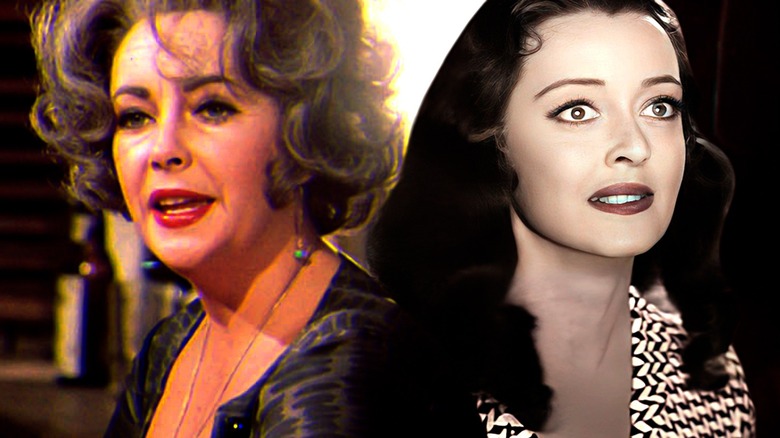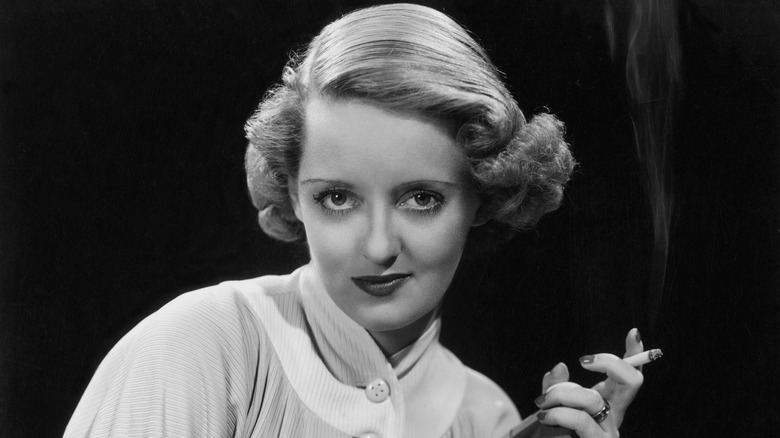'What A Dump': How A Line From Bette Davis' Biggest Flop Became A Gay Cinema Icon
A good line has the power to redeem an otherwise entirely forgettable movie. It might not make it a masterpiece, but if you get those couple of words wedged into the cultural zeitgeist just right, they can become the makings of a cult classic. Such is the case with "Beyond the Forest," the campy bomb that marked the end of Bette Davis' 18-year run at Warner Bros. back in 1949. The film's melodramatic take on domestic life gone dull is far from riveting cinema, but it remains a curiously significant piece of movie history thanks to what's arguably Davis' most famous line ever: "What a dump."
Those three little words, uttered by Davis' Rosa Moline in a moment of pure disdain, are now an indelible piece of the cinematic pantheon. The side-eye glance at the room in question, the picture-perfect physicality, and Davis' patented dry delivery all combine for a perfect storm. In more recent years, the line has become particularly iconic in the gay community, and specifically in the drag queen scene, where high camp is the name of the game and golden-age Hollywood starlets are frequently paid tribute to.
Aptly, though, the path from late-'40s critical failure to contemporary queer refrain wasn't exactly a straight line. The story of "What a dump" is a curious one, to say the least, and Bette Davis isn't the only Hollywood star responsible for the line's continued appeal.
Bette Davis, Elizabeth Taylor, and the making of queer history
"Beyond the Forest" was widely panned upon its initial release, and it marked a less-than-amiable split between Bette Davis and the studio she'd worked under for nearly two decades. And yet, it was apparently memorable enough for acclaimed playwright Edward Albee to reference it in his famous 1962 play, "Who's Afraid of Virginia Woolf." The 1966 film adaptation of that play starred Elizabeth Taylor as Martha, who, in Taylor's own inimitable style, quotes Davis' "What a dump" line. Thus, its brilliance was brought to a new generation of moviegoers.
Charting the line's journey from Davis to Taylor — each an icon in her own era — is somewhat simpler than charting how it became so iconic in the gay community specifically. A video retrospective on Davis posted to YouTube by noted drag performer Jaymes Mansfield describes how "gays rediscovered the film," calling it a "treasured gem of camp." Old-school Hollywood actresses like Davis, Taylor, Mae West, and Judy Garland have long been icons in the gay community, representing a certain blend of resilience, grace, and femininity.
"Davis's star career has become inextricably enmeshed with the history of gay male fandom," film and literature professor David Greven writes on his blog, Jump Cut. He argues, "An important aspect of the woman's transformation, one of the woman's film's defining events, is its metaphorical value as a coming out allegory. I speculate that one of the reasons why gay men have been so drawn to the genre is that the woman's travails and specifically her transformation allegorize both closeted gay male identity and coming out."
Reading for filth
Close to a century after her film debut, Bette Davis remains a huge gay icon. Writing for Diversity Rules Magazine in 2019, Tony Guadagnino described her roles as frequently paralleling the closeted queer experience: "the fear of coming out, the fear of rejection, the fear that someone will figure out your deepest secret." There's even a 2009 documentary about Davis' icon status in the queer community. Combine that legacy with such a beautifully rich line, and you get cinematic history.
In the drag world in particular — a realm of performance where golden-age stars are frequently impersonated and paid tribute to — the line holds even more weight. Anyone who knows anything about drag will know that reading is fundamental, and like the greatest drag queens, Davis' characters read her rivals and enemies for filth at every opportunity. "What a dump" is simply the most concise, cutting, and lasting read she ever made on the silver screen.


